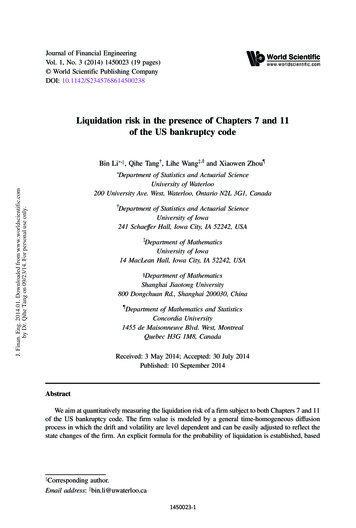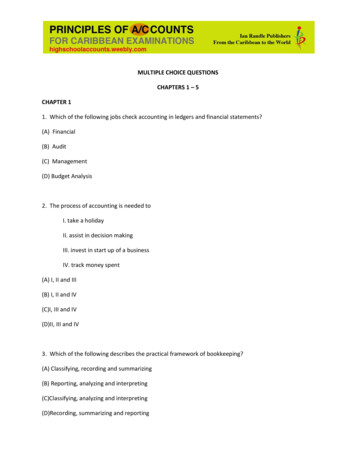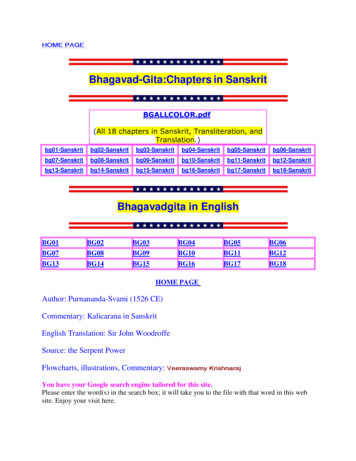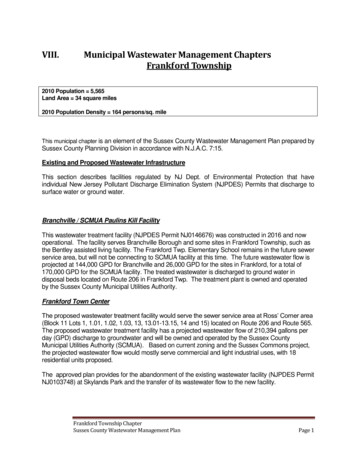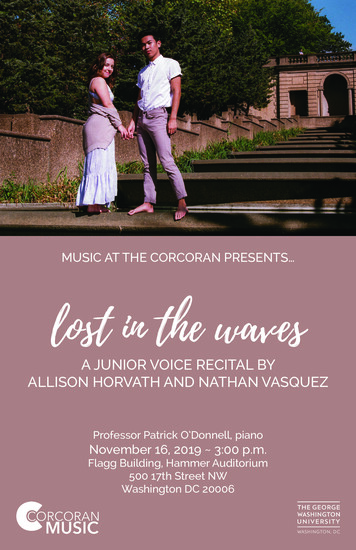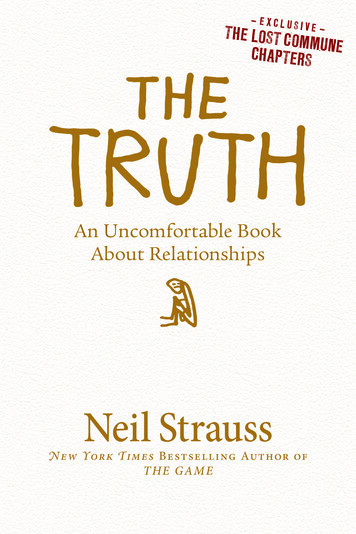
Transcription
–EXCLUSITHE LOST C V E –OMMUNECHAPTERSAn Uncomfortable BookAbout RelationshipsNeil StraussN ew York Times Bestselling Author ofTHE GAME
IntroductionThe following was originally an entire section of The Truth. While editing, itfelt like the story was self-contained and could be removed almost entirelywithout harming the overall narrative of the book.Note that this section was excised during an early draft. So unlike thefinished book, it has not been edited, cut for pacing, copyedited, or factchecked. So please forgive any errors, places where it drags (and there aremany), overlaps with the published book, or general idiocy on the part ofthe protagonist.
1TThis time I’m doing it right. And that’s because I’m doing it differently.THE TREEHOUSECOMMUNITY GUIDELINES1. The rules, attitudes, judgments, and limiting beliefs of the“real world” do not apply here. We are creating a better wayto live.2. The goal is to live neither a strict nor a self-indulgent lifestyle,but to live a balanced lifestyle.3. We will endeavor to remove the “filters” that keep us fromseeing others as they are. Instead, we often see them inrelation to our self-esteem or past experiences we’ve had. Ashousemates, our goal is to always see the best in each otherand assume the best intentions.“Honestly, what’s helped us and could help you is our philosophy,” Ilanasays. “And our philosophy is that life is perfect and I am perfect. That ideais what binds us together.”By us, Ilana is referring to the sixty or so members of Lafayette Morehousejust outside San Francisco, one of the country’s oldest and most successfulcommunes. Since its formation in 1962, it has spawned additional Morehousesaround the world—and its teachings have been ripped off by countless othersexual and communal movements. I’m in front of a panel consisting ofIlana, Judy, and Colin, all commune members in their forties and fifties.As we speak, I have a rough manifesto on group living that I’ve created infront of me, which I busily revise as they preside over the rules like a councilof Mormon elders. In two weeks, I’ll be showing it to the nine members ofmy own commune.
4The TruTh – The LOST COMMuNe ChAPTerS NeIL STrAuSS4. There will be house meetings every morning. During thistime, each resident may check in about whatever he or shewants. A talking stick will be passed around the circle, and onlythe person holding it may speak.5. It is of vital importance to the experience of your fellowhousemates that you do not attempt to caretake them or lookafter their feelings during group meetings. They will benefitmost from your honest, uncensored, and constructive thoughts,advice, and reactions.6. Everything has been planned, but nothing is set in stone.Every day, during the morning meeting, the group can changethe schedule and activities.Lafayette Morehouse was founded as “an experiment in pleasurable groupliving” by a charismatic former Marine, bouncer, and mob enforcer namedVic Baranco in 1968. Like Father Yod, he was tough, had likely killed people,harbored rock-star ambitions, and died early. According to former residents,when Vic was around, if someone left the premises for a few hours, he waslikely to come back to find someone fucking his wife or that he’d been movedto another room. Life was a series of adventures and experiments. DespiteBaranco’s lack of peace-and-love origins—Lafayette Morehouse is probablythe only commune with a boxing ring—his group succeeded and prosperedharmoniously, long outliving thousands of other groups who tried.A month earlier, I’d never heard of Baranco and his Morehouses. Butafter Violet and Nadine left, I read Sex at Dawn and befriended the authors,Christopher Ryan and Cacilda Jethá. But when I asked for their thoughtson replicating the way of life they recommend in their book, Ryan said thatthe world had changed too much since the poly paradise he described. “Theproblem with replicating the conditions we describe is that we don’t live inhunter-gatherer bands of people who’ve known each other over their entirelifetime,” he explained.So far, every so-called expert I’d talked to had said the lifestyle theyrecommended as natural wasn’t possible. Helen Fisher said our nature wasserial monogamy with cheating, but that it’s not responsible or ethical inour society. Isis Aquarian said group marriage worked in the seventies,but wouldn’t work today. And now Ryan was saying our nature is group
5The TruTh – The LOST COMMuNe ChAPTerS NeIL STrAuSSrelationships, but the world has changed too much and become toointerdependent to make them possible.“So are we just relationally homeless, unable to live out our nature inour culture?” I pressed him.And that’s when he gave a little ground. “As human beings, we live in zoosof our own design, from our work to our family structure,” he answered witha sigh. “The question is: Are we going to live in the San Diego Zoo where theenclosures try to replicate our natural environment or in the Jakarta Zoowhere the animals are in concrete cages?”And so I began studying contemporary zoos that tried to create a naturalhabitat for relationships. I started with books on group living —from fictionlike Robert Heinlein’s Stranger in a Strange Land and Robert Rimmer’s TheHarrad Experiment to non-fiction like Robert Houriet’s Getting Back Togetherand Richard Fairfield’s Communes USA. There was a wide gulf between utopiasthat writers imagined in their fictional books and the actual ones peoplecreated in real life. I studied what made them work (qualities of sharing,temperance, and a work ethic) and what made them fall apart (hostility fromneighbors, in-fighting, megalomaniacal leaders, accepting new membersindiscriminately).Then I went in search of still-existing communities. All roads seemedto point to only three that were successful, long-standing, and significant:the Zegg Intentional Community in Germany, the Osho Ashram in India,and, closer to home, Lafayette Morehouse in California.“I want to get as much information as I can to make things go smoothlywhen we try out this group relationship,” I tell the Morehouse triad. “Onething you say now may save the entire group.”“How brave and deliberate,” says Judy, who, with her thin frame, brownbowl cut, and hoop-earrings, looks simultaneously strict and sensitive. “Alot of people just hope for the best. This is a much better plan. It’s somethingwe’ve researched for forty-five years.”“I’d recommend having your partners join for only a couple of weeksand not give up their apartments,” her more reticent sister Ilana says. “Say,‘Look, we trust that we’re gonna love you, but we think we should get toknow each other, hang out, see how it all works, and then decide if it suitsyou before moving in.’”It’s good advice. I jot it down and continue:
6The TruTh – The LOST COMMuNe ChAPTerS NeIL STrAuSS7. This is a safe space. The walls and roles you may put up inthe outside world are not necessary here, because you are notbeing judged or evaluated. The more you share your truthand your vulnerabilities, the more intimacy and growth youwill experience.8. There is no leader here. There may be people organizingor teaching, but everyone is equal and has equal say ineverything.“We have a recommendation,” Judy says. “It’s called the one-no vote. Andthe only groups that we have seen that make it, including groups of two, arepeople who treat each other that way.”“Can you explain it?” I look at them curiously, clustered together on anold couch, super-heroes of communal living, all almost sharing the same hivemind. They don’t look remarkable or out-of-the-ordinary or alternative inany way. If anything stands out about them, it’s that they seem disconnectedfrom any fad, trend, or style. If I passed them on the street, I’d think theyworked in a library with a lax dress code.“Yes, it’s that if one person votes no on something,” Ilana elaborates,“then it doesn’t happen.”“Can there be a re-vote later?”“No. We truly honor people’s no’s. However, we’ve had only like two novotes in our entire forty-five years. So if someone is even looking like theydon’t want something to happen, instead of voting, we’ll back off and talk. ““It’s very empowering to everyone,” Judy adds. “Once you know that yourvoice will be heard and that even if you just hint that you’re going to object,people will stop and listen to you. So each person has so much influencethat they don’t have to go around bludgeoning people with it.”9. While no meal or event is mandatory, showing up willalways benefit your life, your experience, and yourrelationship with your housemates.10. Make an attempt throughout the week to interact and spendtime with everyone, rather than just staying close to someoneyou already know.
7The TruTh – The LOST COMMuNe ChAPTerS NeIL STrAuSS“We actually take care of at least one person on sanctuary, which is tosay one person who needs help,” Judy adds. “It could be a homeless personor somebody who just needs a break from life in some way. You don’t have todo that, but a Morehouse does that. We feel like it reminds us of the surplusand the good life that we have. It’s also a way to pay back.”“Really?” I’m shocked to hear this. “Isn’t it hard enough for so manypeople to live together as it is, without introducing a homeless person as awild card?”“Actually it can be a way to unify the group because any group will aligneither on a common good or a common enemy. Often it’s easier to alignbehind a common enemy, so you have to really reach for the good by doingsomething like taking care of somebody.”11. While group solidarity is important, so are boundaries.If someone is intruding on your physical or psychologicalspace, politely let them know that you need a little space.If you’re not okay with something, say you’re not okaywith it. Similarly, if someone makes that request of you,immediately comply. You can explore the reasons why if youchoose to during house meetings.12. Avoid talking about others behind their back andcomplaining about things in the house. If you have somethingto say about someone, say it in the house meeting to their facewith compassion and empathy. Before making a judgment orcomplaint, think about your part in it and consider whetherit’s really about the other person or about you.“We have quite the opposite philosophy,” Ilana interjects. “We are progossip. We talk about each other behind each other’s back at all times.”“Really? What do you mean?”“Well, if these are people we’re choosing to spend our lives with,presumably they’re good people and we try to assume that they have thebest intentions. So if something’s going on with them, we’ll talk about it.”Experience is the best teacher, and often the lessons are counterintuitive.This simple conversation is going to make the commune far more likely tosucceed than the harem.“We notice each other,” Judy elaborates. “Like, ‘Did you see her face? She
8The TruTh – The LOST COMMuNe ChAPTerS NeIL STrAuSSlooks like something is upsetting her. Let’s find out what’s going on.’ Sothe outcome is interest and caring, and ultimately talking with someonedirectly, not decimating them.”“But what do you do with someone who’s just annoying and hard to livewith, and doesn’t really listen or change when you bring it up with them?Do you eventually ask them to leave?”“We call that person who’s the most annoying person in the group TheBiggest Asshole,” Judy explains patiently as I sit there practically awestruck.They have an answer for everything. “Regardless of how small the groupis, somebody will take that spot. I guarantee it. You’re going to be temptedto say, ‘Man, this would be a great group if only we didn’t have Gary whouses up all the toilet paper or doesn’t refill the ice cube tray or whatever.’ Soyou get rid of Gary and you think everything’s going to be great now, andwhat we have found is that somebody who had been perfectly fine untilthat person left steps up to be The Biggest Asshole—and it turns out they’reactually worse. So you keep getting rid of people until you’re alone, and thenyou find who the Biggest Asshole really is.”The more I think about that concept, the more powerful it seems to be.People always say, “The world would be better if a certain regime was deposedor if various people, religions, ideas, and even countries didn’t exist. But therewill always be a biggest asshole in the world. And usually the people seen asthe biggest asshole—whether it’s Nazis, Communists, or violent extremists—are trying to eliminate others they see as the biggest assholes. So the secretto world peace may just be for everyone to stop saying “the world would bea better place if only those guys were gone or moved somewhere else.”13. One good way to give feedback is to use the following format:When you (did/said something), what I made upabout that is ( your subjective impression), and Ifelt (emotion).Half the rules for the house came directly from rehab. I suppose ultimatelysex addiction counseling is about teaching people how to live in relation toothers. If you remove the shaming of sexuality from the therapy, it becomesgreat training for any type of relationship.
9The TruTh – The LOST COMMuNe ChAPTerS NeIL STrAuSS“Are there other roles that people fall into besides the biggest asshole?”I ask them, fascinated.“One role that’s really valuable around here is someone who’s just happy.They may not be good at electricity or plumbing or computers or cleaning,but when they come around, people feel good in their presence. It’s not arole you can assign somebody and say, ‘Okay, now you be the happy person.’You just gotta luck into it.”“There are lots of other roles,” adds Colin, who’s barely been able to geta word in edge-wise. He has a boyish face topped by short grey hair, andthough he’s soft-spoken, at times he seems to bristle with irritation “Thereare people who support the action and people who challenge the action. Andthere are people who always
Neil Strauss ˆˇ B ˆˇ A THE GAME – T OMMUNE TERS An Uncomfortable Book About Relationships. T he following was originally an entire section of The Truth. While editing, it felt like the story was self-contained and could be removed almost entirely without harming the overall narrative of the book. Note that this section was excised during an early draft .
